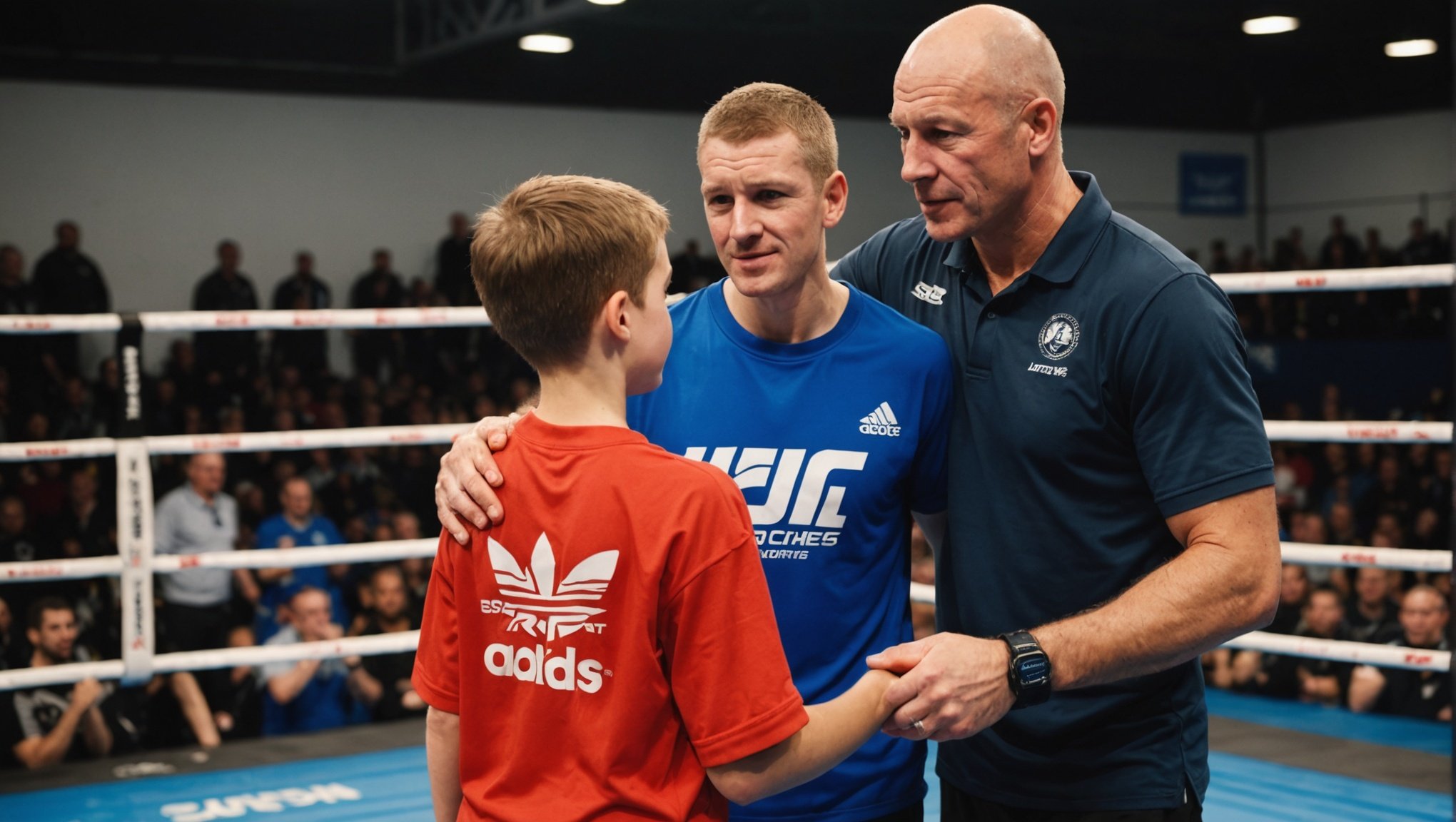Supporting your child's aspirations in UK combat sports can seem daunting, but guidance and encouragement can make a world of difference. From fostering resilience to understanding the importance of discipline, parents play a pivotal role in shaping their child's athletic journey. This guide provides practical tips and insights for navigating the unique landscape of combat sports, helping you empower your child to thrive both inside and outside the ring. Equip yourself with the knowledge to champion your child's passion and foster a lasting love for the sport.
Understanding Combat Sports in the UK
Combat sports in the UK offer a diverse range of activities for enthusiasts of all ages. From boxing and karate to judo and taekwondo, there are numerous types of combat sports available that cater to varying interests and skill levels. Each sport provides unique challenges and benefits, making them appealing to a wide audience.
Also to see : Unlock Explosive Strength: A Comprehensive Guide to Plyometric Training for UK Wrestlers
Participating in combat sports can be particularly beneficial for children. These activities promote physical fitness, improve coordination, and enhance discipline and self-confidence. Moreover, they teach valuable life skills such as perseverance and respect for others. Engaging in such sports can also help children develop a sense of camaraderie and teamwork, which are essential attributes for personal growth.
Safety is a paramount concern in UK combat sports. The country adheres to strict regulations and guidelines to ensure the well-being of participants. Governing bodies enforce rules regarding protective gear, weight classes, and age-appropriate competitions to minimise risks. Coaches and trainers are required to have proper certifications to ensure they provide safe and effective instruction. These measures help create a secure environment where individuals can enjoy the benefits of combat sports without compromising their safety.
Also read : Empowering Local Communities: The Role of UK Combat Sports Organizations in Community Enrichment
Choosing the Right Combat Sport for Your Child
Selecting the appropriate combat sport for your child involves considering several factors. Primarily, aligning the sport with your child's interests and abilities is crucial. Children are more likely to enjoy and commit to a sport if it resonates with their personal preferences and strengths. Begin by discussing various options with your child and observing their reactions to different sports. This can provide insights into their genuine interests.
Assessing your child's skill level is also vital. Some sports may require a higher degree of coordination or strength, while others may focus more on flexibility or strategic thinking. Understanding your child's current capabilities can help determine which sport might offer the best opportunities for growth and development.
When choosing a combat sport, consider the potential for skill development. Some sports, like judo or karate, may offer more comprehensive skill-building opportunities, including discipline and respect. Evaluate the availability of qualified coaches and safe training environments, as these can significantly impact your child's experience and progress. By carefully considering these factors, you can select a combat sport that not only matches your child's interests and abilities but also supports their overall development and enjoyment.
Finding Quality Training Resources
Identifying reputable training facilities is essential for a positive combat sports experience. Start by researching local clubs with a strong reputation for safety and success. Look for facilities that are accredited by governing bodies, as this ensures adherence to quality standards and guidelines. Visiting the facility in person allows you to assess the environment and equipment.
The role of qualified coaches cannot be overstated. Coaches with proper certifications and experience significantly impact a child's development in combat sports. They provide tailored instruction, focusing on technique and safety, which helps build a solid foundation. Inquire about a coach's qualifications and track record before enrolling your child in a program.
Understanding the structure of training programs is crucial. Programs should be age-appropriate and cater to different skill levels, offering a progression path from beginner to advanced stages. This ensures continuous development and keeps children engaged. Training programs often include a mix of physical conditioning, technique refinement, and sparring practice, which collectively enhance a child's skills and confidence.
By prioritising quality training resources, you can ensure your child receives the best possible instruction, fostering a safe and supportive environment for growth in combat sports.
Supporting Your Child's Training Journey
Parental support plays a crucial role in a child's success in combat sports. Encouraging your child by showing interest in their progress and attending their training sessions can significantly boost their motivation. Celebrate their achievements, no matter how small, and provide constructive feedback to help them improve. This consistent support can foster a positive attitude towards their training journey.
Understanding the training schedules is vital for effective support. Combat sports often require a structured routine, with sessions multiple times a week. Familiarise yourself with the schedule and ensure it aligns with your child's school and social commitments. This helps maintain a healthy balance, preventing burnout and ensuring they enjoy their training.
Balancing training with academic and social life is essential. Encourage your child to manage their time effectively, prioritising both their studies and sports commitments. Help them create a schedule that accommodates homework, training, and leisure activities. This balance is key to sustaining their enthusiasm and ensuring holistic development.
By actively participating in your child's training journey, you can provide the motivation and support they need to thrive in combat sports. Your involvement not only enhances their experience but also strengthens your bond with them.
Nutrition and Health for Young Athletes
For young athletes, nutrition plays a pivotal role in enhancing athletic performance and overall health. A well-balanced diet tailored to combat sports can significantly impact energy levels, recovery, and growth. Ensuring that young athletes consume the right nutrients helps them perform at their best during training and competitions.
Healthy eating guidelines for combat sports should focus on providing adequate energy from carbohydrates, proteins, and fats. Carbohydrates are essential for maintaining energy levels during intense training sessions. Proteins support muscle repair and growth, while healthy fats contribute to overall energy intake. Including a variety of fruits and vegetables ensures that athletes receive essential vitamins and minerals to support their immune system and recovery.
Hydration is another critical aspect of an athlete's diet. Proper hydration helps regulate body temperature, maintain joint lubrication, and prevent fatigue. Athletes should drink water regularly throughout the day and consume fluids before, during, and after training sessions to stay hydrated. Monitoring urine colour can be a simple method to assess hydration levels; pale yellow indicates adequate hydration, while darker shades suggest the need for more fluids.
By prioritising nutrition and hydration, young athletes can optimise their performance and maintain their health during their combat sports journey.
Navigating Competitions and Events
Preparing your child for combat sports competitions involves both mental and physical readiness. Physically, ensure they maintain consistent training leading up to the event. Mentally, focus on building confidence and a positive mindset. Encourage visualisation techniques, where your child imagines themselves successfully executing moves during the competition.
Understanding the competition structure in UK combat sports is crucial. Typically, events are organised by age and weight categories to ensure fair matches. Familiarise yourself with the rules and scoring system of the specific sport your child is participating in. This knowledge helps in setting realistic expectations and preparing your child for what to anticipate during the event.
Stress management is a vital component of event preparation. Encourage your child to develop strategies to stay calm under pressure, such as deep breathing exercises or listening to music. Highlight the importance of focusing on personal performance rather than outcomes. Remind them that competitions are opportunities to learn and grow, not just to win.
By addressing these elements, you can help your child navigate the challenges of competitions and events confidently, ensuring they have a positive and enriching experience in their combat sports journey.
Career Pathways in Combat Sports
Exploring combat sports careers offers a wide array of opportunities beyond just competing. While many envision the pinnacle of success as a professional athlete, numerous other roles contribute to the vibrant world of combat sports.
Job opportunities abound in coaching, where experienced individuals can guide and mentor the next generation of athletes. Coaching requires not only technical knowledge but also the ability to inspire and develop tailored training plans. Refereeing is another avenue, demanding a deep understanding of the sport's rules and the ability to make quick, fair decisions during matches.
For those interested in the organisational side, sports management offers roles in event coordination, marketing, and athlete representation. These positions require strategic thinking and excellent communication skills to ensure successful event execution and athlete promotion.
To explore these career paths, individuals can utilise resources such as industry workshops, certifications, and networking events. Engaging with professional associations can provide valuable career advice and insights into the evolving landscape of combat sports. By understanding the various roles available, aspiring professionals can find their niche and contribute to the dynamic field of combat sports.
Success Stories and Role Models
In the world of combat sports, success stories serve as powerful inspiration for young athletes. The UK has produced remarkable athletes who have achieved great heights, becoming role models for aspiring fighters.
One notable figure is Nicola Adams, a trailblazer in women's boxing. Her journey from humble beginnings to winning Olympic gold has inspired countless young athletes. Her success story highlights the importance of perseverance and dedication in achieving one's dreams.
Similarly, Anthony Joshua's rise in the boxing world exemplifies how hard work and resilience can lead to success. His achievements have made him a role model, particularly for those from diverse backgrounds, demonstrating that anyone can excel with the right mindset and effort.
The impact of these role models extends beyond their sports. They instil values such as discipline, respect, and determination in young athletes. By observing their journeys, aspiring fighters learn valuable lessons about overcoming challenges and setting ambitious goals.
These success stories not only motivate young athletes but also provide a blueprint for their own journeys. By emulating these role models, they can aspire to achieve greatness in their chosen combat sports.
Expert Advice and Resources for Parents
Supporting a young athlete in combat sports requires informed parental guidance. Seeking expert advice is crucial for understanding the nuances of training and competition. Experts can provide insights into balancing sports with academics, managing stress, and maintaining motivation. Engaging with professionals ensures that parents are equipped to support their child's athletic journey effectively.
Numerous resources for parents are available to enhance their understanding. Books on sports psychology and child development offer valuable perspectives. Websites dedicated to combat sports provide up-to-date information on training techniques and safety guidelines. Additionally, organisations such as Sport England offer resources specifically designed for parents, helping them navigate the complexities of youth sports.
Building a network with other parents in the combat sports community can also be beneficial. This network provides a platform to share experiences, advice, and support, fostering a sense of camaraderie. Parents can exchange tips on training schedules, nutrition, and competition preparation, enriching their knowledge and confidence in supporting their young athlete.
By leveraging expert advice and tapping into available resources, parents can play an integral role in their child's success and enjoyment in combat sports.













